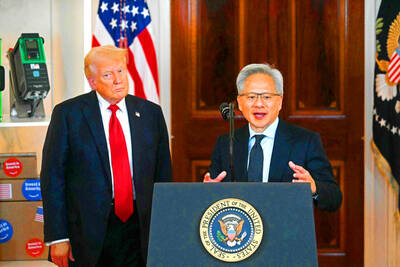Mercuries Life Insurance Co (三商美邦人壽) shares surged to a seven-month high this week after local media reported that E.Sun Financial Holding Co (玉山金控) had outbid CTBC Financial Holding Co (中信金控) in the financially strained insurer’s ongoing sale process.
Shares of the mid-sized life insurer climbed 5.8 percent this week to NT$6.72, extending a nearly 18 percent rally over the past month, as investors bet on the likelihood of an impending takeover.
The final round of bidding closed on Thursday, marking a critical step in the 32-year-old insurer’s search for a buyer after years of struggling to meet capital adequacy requirements.

Photo: Wu Hsin-tien, Taipei Times
Local media reports said E.Sun’s offer was about NT$8.2 per share, compared with CTBC’s NT$7.6 per share, though neither of the companies have confirmed the details.
CTBC on Thursday said that its board of directors had approved an investment plan without naming the target, fueling speculation that it had submitted a formal bid.
E.Sun has not issued any statement, while Mercuries declined to comment, calling the reports “market rumors.”
If the process proceeds smoothly, the preferred bidder could be announced in the second half of next month, after the parties finalize pricing and obtain board approval, the reports said.
Mercuries Life, which manages about NT$1.5 trillion (US$48.68 billion) of assets and ranks as Taiwan’s seventh-largest life insurer, has failed to meet the statutory 200 percent risk-based capital ratio for seven consecutive reporting periods. Its net-worth ratio also remains below the 3 percent regulatory threshold, leaving it under sustained pressure from the Financial Supervisory Commission.
With Taiwan’s new insurance capital standard set to take effect next year, capital requirements are poised to tighten further and Mercuries Life risks losing operational flexibility under the new framework without a deep-pocketed backer.
The insurer has attempted multiple capital injections and bond issues with limited success, leading to the current sale process — led by Morgan Stanley — to secure a stable strategic investor.
For E.Sun, acquiring Mercuries Life would mark its first major step into the life insurance business, complementing its strength in banking and wealth management. CTBC, already one of Taiwan’s most diversified financial groups, would also benefit from broadening its insurance portfolio.
Mercuries Life is reportedly leaning toward a share-swap deal that would allow it to benefit from the buyer’s long-term growth. Its capital shortfall has depressed its market valuation, making a full cash sale less attractive.
Market watchers say the contest between E.Sun and CTBC underscores the accelerating consolidation in Taiwan’s life insurance sector, as tighter regulations, prolonged low interest rates and the coming shift to Taiwan’s new insurance capital standard push smaller insurers to seek stronger partners.

Taiwan Semiconductor Manufacturing Co (TSMC, 台積電) last week recorded an increase in the number of shareholders to the highest in almost eight months, despite its share price falling 3.38 percent from the previous week, Taiwan Stock Exchange data released on Saturday showed. As of Friday, TSMC had 1.88 million shareholders, the most since the week of April 25 and an increase of 31,870 from the previous week, the data showed. The number of shareholders jumped despite a drop of NT$50 (US$1.59), or 3.38 percent, in TSMC’s share price from a week earlier to NT$1,430, as investors took profits from their earlier gains

AI TALENT: No financial details were released about the deal, in which top Groq executives, including its CEO, would join Nvidia to help advance the technology Nvidia Corp has agreed to a licensing deal with artificial intelligence (AI) start-up Groq, furthering its investments in companies connected to the AI boom and gaining the right to add a new type of technology to its products. The world’s largest publicly traded company has paid for the right to use Groq’s technology and is to integrate its chip design into future products. Some of the start-up’s executives are leaving to join Nvidia to help with that effort, the companies said. Groq would continue as an independent company with a new chief executive, it said on Wednesday in a post on its Web

CHINA RIVAL: The chips are positioned to compete with Nvidia’s Hopper and Blackwell products and would enable clusters connecting more than 100,000 chips Moore Threads Technology Co (摩爾線程) introduced a new generation of chips aimed at reducing artificial intelligence (AI) developers’ dependence on Nvidia Corp’s hardware, just weeks after pulling off one of the most successful Chinese initial public offerings (IPOs) in years. “These products will significantly enhance world-class computing speed and capabilities that all developers aspire to,” Moore Threads CEO Zhang Jianzhong (張建中), a former Nvidia executive, said on Saturday at a company event in Beijing. “We hope they can meet the needs of more developers in China so that you no longer need to wait for advanced foreign products.” Chinese chipmakers are in

POLICY REVERSAL: The decision to allow sales of Nvidia’s H200 chips to China came after years of tightening controls and has drawn objections among some Republicans US House Republicans are calling for arms-sale-style congressional oversight of artificial intelligence (AI) chip exports as US President Donald Trump’s administration moves to approve licenses for Nvidia Corp to ship its H200 processor to China. US Representative Brian Mast, the Republican chairman of the US House Committee on Foreign Affairs, which oversees export controls, on Friday introduced a bill dubbed the AI Overwatch Act that would require the US Congress to be notified of AI chips sales to adversaries. Any processors equal to or higher in capabilities than Nvidia’s H20 would be subject to oversight, the draft bill says. Lawmakers would have